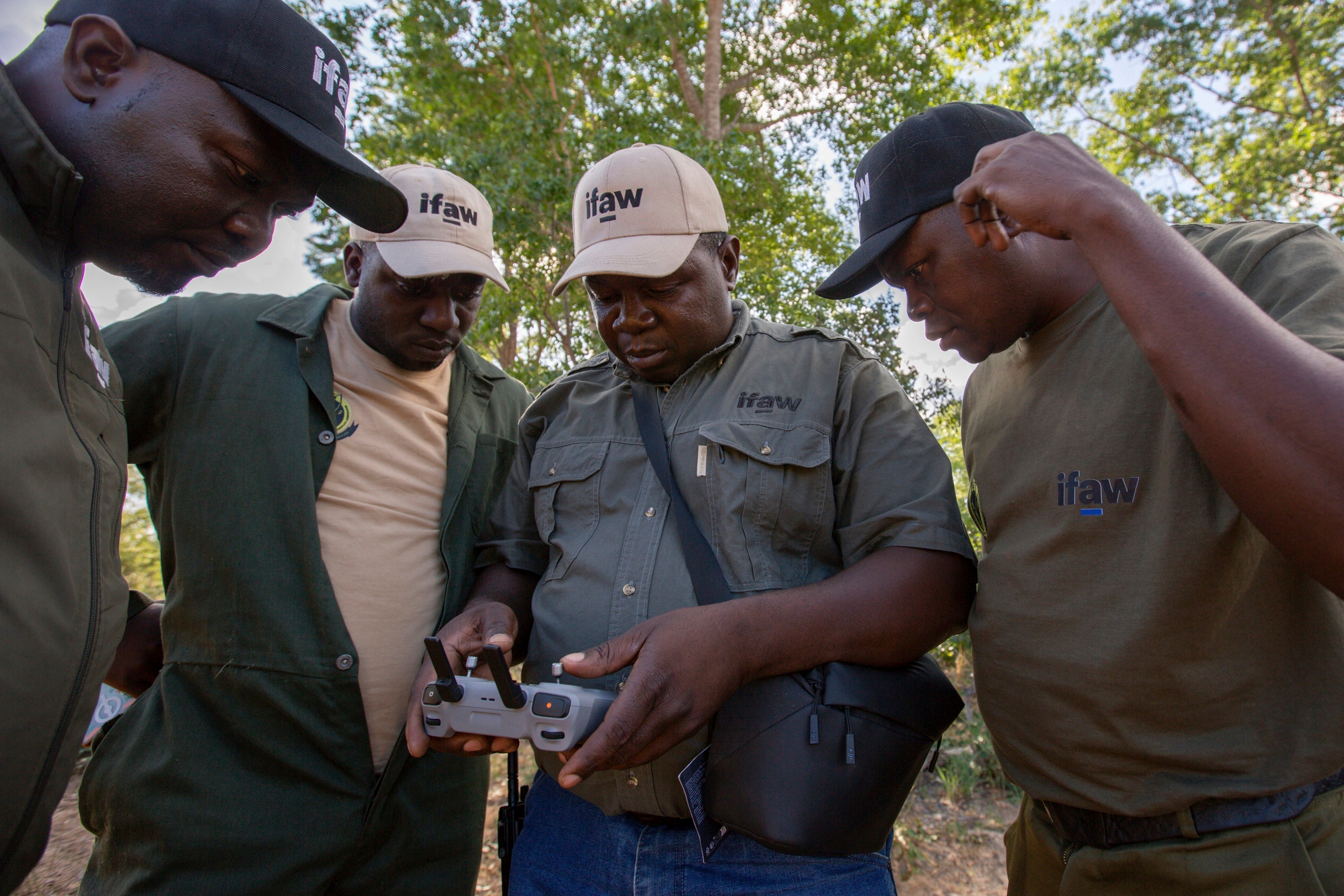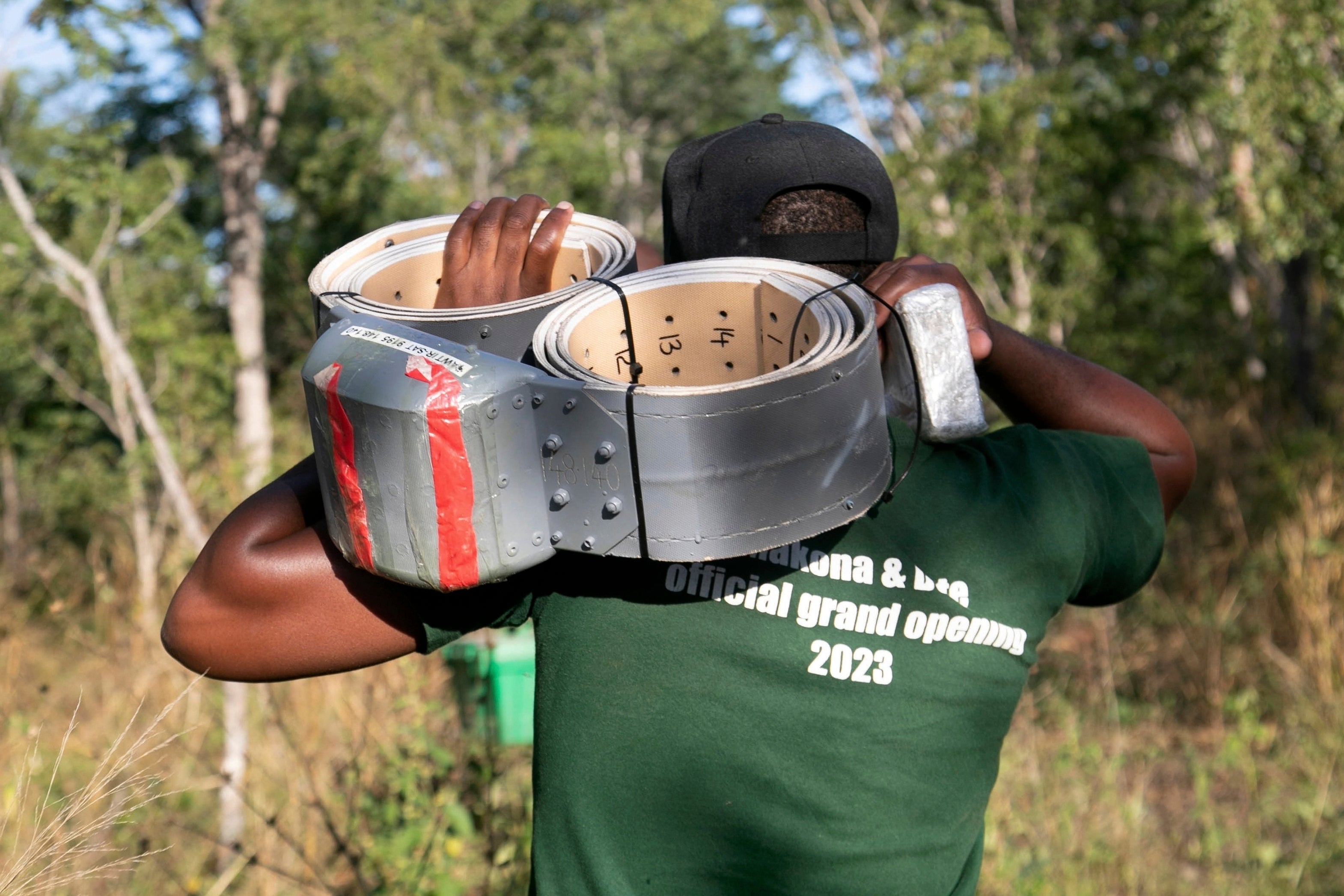Capon Sibanda races against time, his bicycle a blur against the backdrop of Zimbabwe’s landscape. His mission: to warn villagers near Hwange National Park of approaching elephants. Armed with GPS-triggered alerts from a new tracking system, Sibanda disseminates warnings through WhatsApp groups and pedals to remote areas where phones and internet access are scarce.
This innovative system, launched last year by the Zimbabwe Parks and Wildlife Management Authority and the International Fund for Animal Welfare, tracks elephants fitted with GPS collars. The goal is simple but crucial: prevent dangerous encounters between humans and elephants. These encounters are becoming increasingly frequent as climate change exacerbates competition for dwindling resources like food and water.
“When we started it was more of a challenge, but it’s becoming phenomenal,” said Sibanda, 29, one of the local volunteers trained to be community guardians.

For generations, villagers banged pots, shouted or burned dung to drive away elephants. But worsening droughts and shrinking resources have pushed the animals to raid villages more often, destroying crops and infrastructure and sometimes injuring or killing people.
Zimbabwe’s elephant population is estimated at around 100,000, nearly double the land’s capacity. The country hasn’t culled elephants in close to four decades. That’s because of pressure from wildlife conservation activists, and because the process is expensive, according to parks spokesman Tinashe Farawo.
Conflicts between humans and wildlife such as elephants, lions and hyenas killed 18 people across the southern African country between January and April this year, forcing park authorities to kill 158 “trouble” animals during that period.
“Droughts are getting worse. The elephants devour the little that we harvest,” said Senzeni Sibanda, a local councilor and farmer, tending her tomato crop with cow dung manure in a community garden that also supports a school feeding program.

Technology now supports the traditional tactics. Through the EarthRanger platform introduced by IFAW, authorities track collared elephants in real time. Maps show their proximity to the buffer zone — delineated on digital maps, not by fences — that separate the park and hunting concessions from community land.
At a park restaurant one morning IFAW field operations manager Arnold Tshipa monitored moving icons on his laptop as he waited for breakfast. When an icon crossed a red line, signaling a breach, an alert pinged.
“We’re going to be able to see the interactions between wildlife and people,” Tshipa said. “This allows us to give more resources to particular areas.”
The system also logs incidents like crop damage or attacks on people and livestock by predators such as lions or hyenas and retaliatory attacks on wildlife by humans. It also tracks the location of community guardians like Capon Sibanda.
“Every time I wake up, I take my bike, I take my gadget and hit the road,” Sibanda said. He collects and stores data on his phone, usually with photos. “Within a blink,” alerts go to rangers and villagers, he said.
His commitment has earned admiration from locals, who sometimes gift him crops or meat. He also receives a monthly food allotment worth about $80 along with internet data.
Parks agency director Edson Gandiwa said the platform ensures that “conservation decisions are informed by robust scientific data.”

Villagers like Senzeni Sibanda say the system is making a difference: “We still bang pans, but now we get warnings in time and rangers react more quickly.”
Still, frustration lingers. Sibanda has lost crops and water infrastructure to elephant raids and wants stronger action. “Why aren’t you culling them so that we benefit?” she asked. “We have too many elephants anyway.”
Her community, home to several hundred people, receives only a small share of annual trophy hunting revenues, roughly the value of one elephant or between $10,000 and $80,000, which goes toward water repairs or fencing. She wants a rise in Zimbabwe’s hunting quota, which stands at 500 elephants per year, and her community’s share increased.

The elephant debate has made headlines. In September last year, activists protested after Zimbabwe and Namibia proposed slaughtering elephants to feed drought-stricken communities. Botswana’s then-president offered to gift 20,000 elephants to Germany, and the country’s wildlife minister mock-suggested sending 10,000 to Hyde Park in the heart of London so Britons could “have a taste of living alongside elephants.”
Zimbabwe’s collaring project may offer a way forward. Sixteen elephants, mostly matriarchs, have been fitted with GPS collars, allowing rangers to track entire herds by following their leaders. But Hwange holds about 45,000 elephants, and parks officials say it has capacity for 15,000. Project officials acknowledge a huge gap remains.
In a recent collaring mission, a team of ecologists, vets, trackers and rangers identified a herd. A marksman darted the matriarch from a distance. After some tracking using a drone and a truck, team members fitted the collar, whose battery lasts between two and four years. Some collected blood samples. Rangers with rifles kept watch.
Once the collar was secured, an antidote was administered, and the matriarch staggered off into the wild, flapping its ears.
“Every second counts,” said Kudzai Mapurisa, a parks agency veterinarian.





